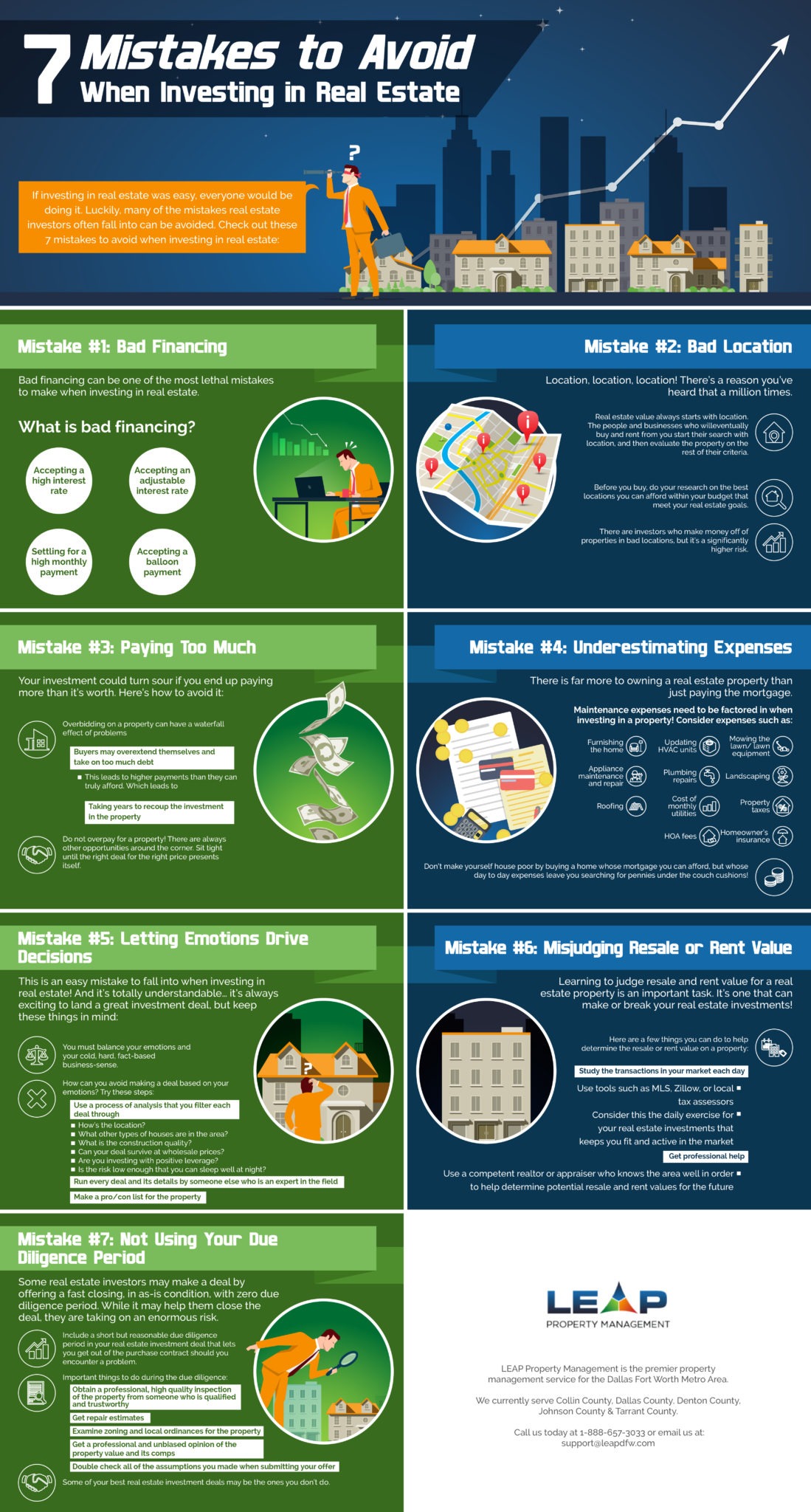
Share this Image On Your Site
If investing in real estate was easy, everyone would be doing it. Luckily, many of the mistakes real estate investors often fall into can be avoided. Check out these 7 mistakes to avoid when investing in real estate:
Mistake #1: Bad Financing
Bad financing can be one of the most lethal mistakes to make when investing in real estate
- What is bad financing?
- Accepting a high interest rate
- Accepting an adjustable interest rate
- Settling for a high monthly payment
- Accepting a balloon payment
Mistake #2: Bad Location
Location, location, location! There’s a reason you’ve heard that a million times.
- Real estate value always starts with location. The people and businesses who will eventually buy and rent from you start their search with location, and then evaluate the property on the rest of their criteria.
- Before you buy, do your research on the best locations you can afford within your budget that meet your real estate goals.
- There are investors who make money off of properties in bad locations, but it’s a significantly higher risk.
Mistake #3: Paying Too Much
Your investment could turn sour if you end up paying more than it’s worth. Here’s how to avoid it:
- Overbidding on a property can have a waterfall effect of problems
- Buyers may overextend themselves and take on too much debt
- This leads to higher payments than they can truly afford. Which leads to
- Taking years to recoup the investment in the property
- This leads to higher payments than they can truly afford. Which leads to
- Buyers may overextend themselves and take on too much debt
- Do not overpay for a property! There are always other opportunities around the corner. Sit tight until the right deal for the right price presents itself.
Mistake #4: Underestimating Expenses
There is far more to owning a real estate property than just paying the mortgage
- Maintenance expenses need to be factored in when investing in a property! Consider expenses such as:
- Mowing the lawn/ lawn equipment
- Landscaping
- Updating HVAC units
- Plumbing repairs
- Furnishing the home
- Appliance maintenance and repair
- Property taxes
- Homeowner’s insurance
- Cost of monthly utilities
- HOA fees
- Roofing
- Don’t make yourself house poor by buying a home whose mortgage you can afford, but whose day to day expenses leave you searching for pennies under the couch cushions!
Mistake #5: Letting Emotions Drive Decisions
This is an easy mistake to fall into when investing in real estate! And it’s totally understandable… it’s always exciting to land a great investment deal, but keep these things in mind:
- You must balance your emotions and your cold, hard, fact-based business-sense.
- How can you avoid making a deal based on your emotions? Try these steps:
- Use a process of analysis that you filter each deal through
- How’s the location?
- What other types of houses are in the area?
- What is the construction quality?
- Can your deal survive at wholesale prices?
- Are you investing with positive leverage?
- Is the risk low enough that you can sleep well at night?
- Run every deal and its details by someone else who is an expert in the field
- Make a pro/con list for the property
- Use a process of analysis that you filter each deal through
Mistake #6: Misjudging Resale or Rent Value
Learning to judge resale and rent value for a real estate property is an important task. It’s one that can make or break your real estate investments!
Here are a few things you can do to help determine the resale or rent value on a property:
- Study the transactions in your market each day
- Use tools such as MLS, Zillow, or local tax assessors
- Consider this the daily exercise for your real estate investments that keeps you fit and active in the market
- Get professional help
- Use a competent realtor or appraiser who knows the area well in order to help determine potential resale and rent values for the future
- Study the transactions in your market each day
Mistake #7: Not Using Your Due Diligence Period
Some real estate investors may make a deal by offering a fast closing, in as-is condition, with zero due diligence period. While it may help them close the deal, they are taking on an enormous risk.
- Include a short but reasonable due diligence period in your real estate investment deal that lets you get out of the purchase contract should you encounter a problem.
- Important things to do during the due diligence:
- Obtain a professional, high quality inspection of the property from someone who is qualified and trustworthy
- Get repair estimates
- Examine zoning and local ordinances for the property
- Get a professional and unbiased opinion of the property value and its comps
- Double check all of the assumptions you made when submitting your offer
- Some of your best real estate investment deals may be the ones you don’t do.


